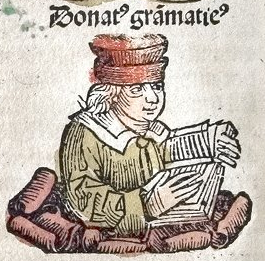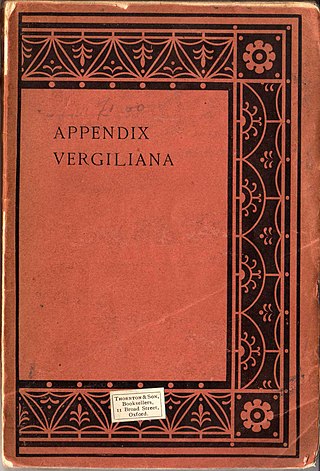Siro (also Syro, Siron, or Syron; fl. c. 50 BC) was an Epicurean philosopher who lived in Naples.
He was a teacher of Virgil, [1] and taught at his school in Naples. There are two poems attributed to Virgil in the Appendix Vergiliana, [2] which mention Siro, and where the author speaks of seeking peace in the company of Siro:
I am setting sail for the havens of the blest to seek the wise sayings of great Siro, and will redeem my life from all care. [3]
Cicero also mentions Siro several times and speaks of Siro along with Philodemus as being "excellent citizens and most learned men." [4] The 5th-century commentator Servius claimed that Siro was commemorated in Virgil's sixth Eclogue as the character Silenus. [5]

Publius Vergilius Maro, usually called Virgil or Vergil in English, was an ancient Roman poet of the Augustan period. He composed three of the most famous poems in Latin literature: the Eclogues, the Georgics, and the epic Aeneid. A number of minor poems, collected in the Appendix Vergiliana, were attributed to him in ancient times, but modern scholars generally regard these works as spurious, with the possible exception of a few short pieces.

In Greek mythology, Cyparissus or Kyparissos was a boy beloved by Apollo or in some versions by other deities. In the best-known version of the story, the favorite companion of Cyparissus was a tamed stag, which he accidentally killed with his hunting javelin as it lay sleeping in the woods. The boy's grief was such that it transformed him into a cypress tree, a classical symbol of mourning. The myth is thus aetiological in explaining the relation of the tree to its cultural significance. The subject is mainly known from Hellenized Latin literature and frescoes from Pompeii. No Greek hero cult devoted to Cyparissus has been identified.
In ancient Greek religion Artemis Caryatis (Καρυᾶτις) was an epithet of Artemis that was derived from the small polis of Caryae in Laconia; there an archaic open-air temenos was dedicated to Carya, the Lady of the Nut-Tree, whose priestesses were called the caryatidai, represented on the Athenian Acropolis as the marble caryatids supporting the porch of the Erechtheum. The late accounts made of the eponymous Carya a virgin who had been transformed into a nut-tree, whether for her unchastity or to prevent her rape. The particular form of veneration of Artemis at Karyai suggests that in pre-classical ritual Carya was goddess of the nut tree who was later assimilated into the Olympian goddess Artemis. Pausanias noted that each year women performed a dance called the caryatis at a festival in honor of Artemis Caryatis called the Caryateia.

Servius, distinguished as Servius the Grammarian, was a late fourth-century and early fifth-century grammarian. He earned a contemporary reputation as the most learned man of his generation in Italy; he authored a set of commentaries on the works of Virgil. These works, In Tria Virgilii Opera Expositio, Commentarii in Virgilium, Commentarii in Vergilii Opera, or Vergilii Carmina Commentarii, constituted the first incunable to be printed at Florence, by Bernardo Cennini, in 1471.

Aelius Donatus was a Roman grammarian and teacher of rhetoric.

The Georgics is a poem by Latin poet Virgil, likely published in 29 BCE. As the name suggests the subject of the poem is agriculture; but far from being an example of peaceful rural poetry, it is a work characterized by tensions in both theme and purpose.

The Appendix Vergiliana is a collection of Latin poems traditionally ascribed as being the juvenilia of Virgil.
In Greek mythology, Nomia (Νομία) was a nymph of Arcadia, where the local people believed the Nomian Mountains to have been named after her.

Alfenus Varus was an ancient Roman jurist and writer who lived around the 1st century BC.

The Cumaean Sibyl was the priestess presiding over the Apollonian oracle at Cumae, a Greek colony near Naples, Italy. The word sibyl comes from the ancient Greek word sibylla, meaning prophetess. There were many sibyls throughout the ancient world. Because of the importance of the Cumaean Sibyl in the legends of early Rome as codified in Virgil's Aeneid VI, and because of her proximity to Rome, the Cumaean Sibyl became the most famous among the Romans. The Erythraean Sibyl from modern-day Turkey was famed among Greeks, as was the oldest Hellenic oracle, the Sibyl of Dodona, dating to the second millennium BC according to Herodotus, favored in the east.

Eclogue4, also known as the FourthEclogue, is a Latin poem by the Roman poet Virgil. The poem is dated to 40 BC by its mention of the consulship of Virgil's patron Gaius Asinius Pollio.
Anser was a minor poet of ancient Rome who lived in the 1st century BC. He is mentioned by Ovid as a writer of love poetry associated with Catullus, Calvus and Cinna. According to the 4th-century AD grammarian Servius, he was a "very bad poet" who wrote in praise of the triumvir Mark Antony and was a detractor of Virgil. None of his work is known to have survived.
Aracynthus was a range of mountains in Aetolia, the exact position of which is uncertain. It was said to run in a south-easterly direction from the Achelous River to the Evenos, and separating the lower plain of Aetolia near the sea from the upper plain above the lakes Hyria and Trichonida.
The name Alcon or Alco can refer to a number of people from classical mythology:
In Greek mythology, Mecon, also spelled Mekon, was a beautiful young Athenian man, loved by the goddess Demeter who was transformed into a poppy.
Lyco and Orphe is a pair of sisters from Greek mythology. Their brief story survives in the works of Maurus Servius Honoratus, a Latin grammarian of the early fifth century AD.
The poem Dirae is one of the poems that make up the Appendix Vergiliana. It is a pastoral poem, told from the perspective of a Sicilian herdsman forced to give up his land to Lycurgus, who is receiving this land as a reward for his participation in the Roman civil wars. The herdsman spends the entire poem cursing the land so Lycurgus cannot benefit from it.

Eclogue 1 is a bucolic poem by the Latin poet Virgil from his Eclogues. In this poem, which is in the form of a dialogue, Virgil contrasts the diverse fortunes of two farmers, Tityrus, an old man whose lands and liberty have been restored to him thanks to the intervention of an unnamed young man, and Meliboeus, who has been forced off his land, which is due to be given to a soldier. It is generally assumed that the poem refers to the confiscations of land that took place around Virgil's home town of Mantua in 41 BC in order to settle retired soldiers after the civil war. The poem has 83 lines, and is written in the dactylic hexameter metre.

Eclogue 3 is a pastoral poem by the Latin poet Virgil, one of a collection of ten poems known as the "Eclogues". This eclogue represents the rivalry in song of two herdsmen, Menalcas and Damoetas. After trading insults, the two men decide to have a singing competition, for which each offers a prize. A neighbour, Palaemon, who comes along by chance, agrees to be the judge. The second half of the poem consists of the contest, in which each of the two competitors in turn sings a couplet and the other caps it with another couplet. In the end Palaemon brings the contest to an end and declares it a draw.

Eclogue 9 is a pastoral poem by the Latin poet Virgil, one of his series of ten poems known as the Eclogues. This eclogue describes the meeting of two countrymen Lycidas and Moeris. Moeris has been turned out of his farm and is taking some kid goats to town for the new occupant; young Lycidas is astonished, for he had heard that Menalcas had secured the safety of the district by his poetry, but Moeris replies that, so far from that being so, he and Menalcas himself had barely escaped with their lives: they then proceed to recall passages of Menalcas' poetry. Lycidas wants to continue singing to lighten the journey but the distressed Moeris begs him to cease, promising that they will sing again when Menalcas returns.